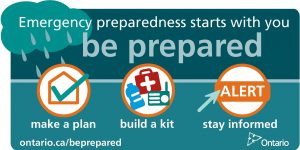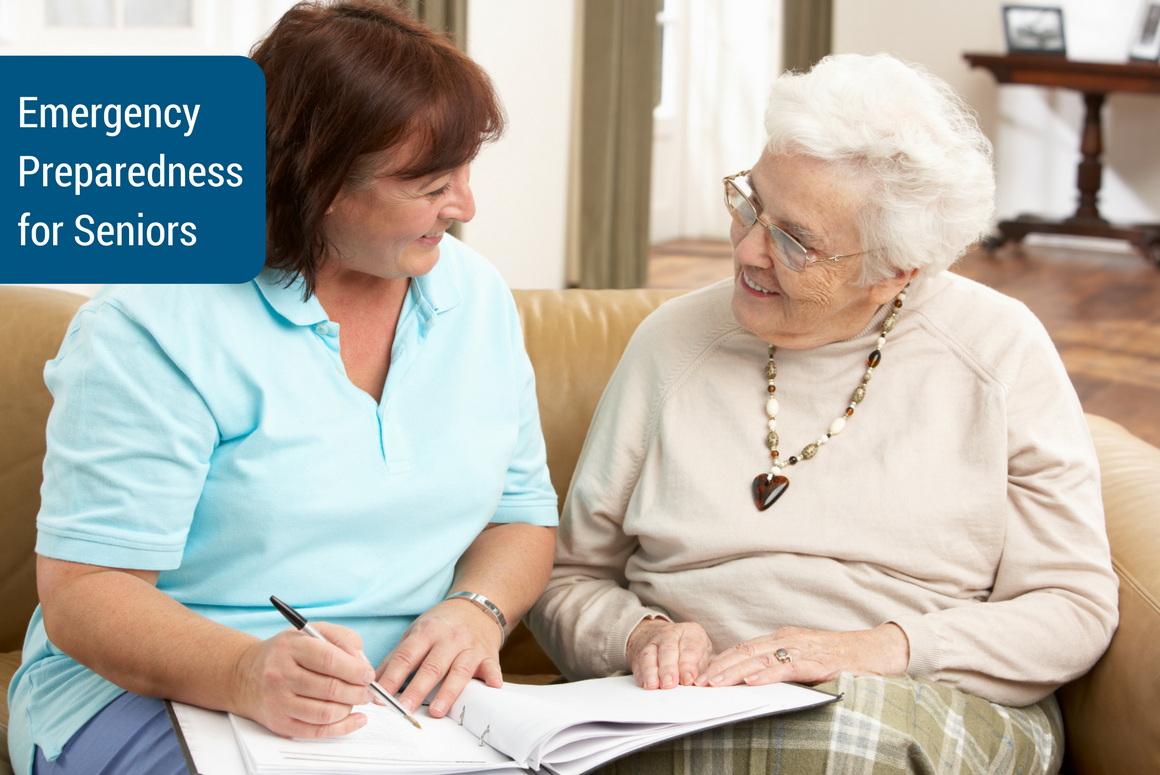Preparing for emergencies is important for everyone but when it comes to looking after our seniors, we need to take some extra special steps to make sure that they are just as safe as everyone else. We’ve gathered a few tips and resources for you to review whether you’re a senior yourself or caring for one.
Get a Kit
Like any other preparedness plan, having a kit makes up a large part of it, so many of the items for seniors are going to be the same as standard household emergency kits (food, water, and other items for at least 72 hours). However, there are a few additional elements to think about:
- Store supplies in one or more containers that are easy to carry – a wheeled container is best!
- Label equipment like wheelchairs, walkers or medical equipment with names, addresses, and phone numbers, and include instructions on how to use each item.
- Include necessary medical supplies, equipment, or medication (include at least a 7-day supply) and regularly check for expiry dates or anything that needs replacing.
- Have extra clothing in case of an emergency in colder months.
For additional items to consider, check out this great article from the Government of British Columbia and don’t forget to read our previous blog post about Building an Emergency Kit for Every Need.
Make a Plan
 Planning ahead can always help in an emergency as it helps us feel prepared, and can reduce anxiety in a stressful situation. It’s important to have a plan for seniors whether they live with family, on their own, or in a nursing or care facility, and be sure to include caregivers too. Consider the following:
Planning ahead can always help in an emergency as it helps us feel prepared, and can reduce anxiety in a stressful situation. It’s important to have a plan for seniors whether they live with family, on their own, or in a nursing or care facility, and be sure to include caregivers too. Consider the following:
- Is special assistance needed in any emergency?
- How will seniors living alone be alerted of a possible emergency? Make sure emergency services know the best way to reach you
- If an evacuation is required, how will you get out of your home quickly and safely?
- Are there pets or service animals that need to be included in the plan?
- Are you prepared to shelter in place if necessary?
- Can you arrange for someone to check on seniors who might be living alone following a disaster or power outage?
Don’t forget to designate an out-of-area contact too just in case family, friends, or neighbours aren’t available in an emergency or disaster. They can help to connect you with your support network, and get you the assistance you need as soon as possible.
For additional considerations, Ready.gov has a quick list that you can review
Other Quick Tips
An emergency kit and communication plan are going to make up the bulk of anyone’s emergency preparedness efforts, but we’ve put together some additional tips to help make sure the seniors in your life are prepared as much as possible:
- If you live in an area at risk of earthquakes, secure bookcases, TVs, heavy furniture, picture frames, and knick knacks with either furniture straps or putty to prevent injury from falling or moving items.
- Test smoke alarms regularly (once per month), and consider a strobe or vibrating system for seniors that might be visually or hearing impaired. Remember to replace smoke alarm batteries once a year, and the smoke alarm itself every 10 years.
- Secure hearing aids or implants that are removed for bed in a bedside container that is attached to a nightstand (Velcro is a great option!) – in the event of an earthquake, this can prevent them from shifting and getting lost or out of reach.
- Move important documents like family records, birth/marriage certificates, wills, etc. into a fire safe in your home or a safety deposit box at the bank so they don’t get damaged in a house fire, flood, or natural disaster.
- Ensure mobility devices (wheelchairs or mobilized chairs/scooters) are always parked in an easily accessible place for quick evacuations.
 For a complete guide on preparedness for seniors, including what do when disaster strikes and useful websites, check out this great guide from the American Red Cross, and get lots of great additional resources from the Center for Disease Control on everything from personal preparedness, to medication and general assistance. You can also check out our previous blog about Preparedness for Seniors.
For a complete guide on preparedness for seniors, including what do when disaster strikes and useful websites, check out this great guide from the American Red Cross, and get lots of great additional resources from the Center for Disease Control on everything from personal preparedness, to medication and general assistance. You can also check out our previous blog about Preparedness for Seniors.
Terms and Conditions
All content provided on this blog is for informational purposes only. The owner of this blog makes no representations as to the accuracy or completeness of any information on this site or found by following any link on this site. The owner will not be liable for any errors or omissions in this information nor for the availability of this information. The owner will not be liable for any losses, injuries, or damages from the display or use of this information. This policy is subject to change at anytime.

